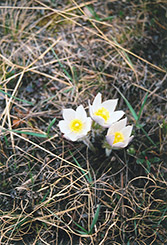It's all about ...
plants

Height: 4 inches
Spread: 4 inches
Sunlight:
![]()
Hardiness Zone: 2a
Other Names: Prairie Pasque Flower
Description:
Blooming in early spring, this selection produces small, dainty buttercup flowers and ferny green leaves; a pretty addition to garden beds or wildflower gardens; a low maintenance variety that attracts pollinators
Ornamental Features
Prairie Pasque Flower has white buttercup flowers with yellow eyes at the ends of the stems in early spring, which are interesting on close inspection. Its deeply cut ferny leaves remain grayish green in colour throughout the season.
Landscape Attributes
Prairie Pasque Flower is an open herbaceous perennial with a more or less rounded form. Its relatively fine texture sets it apart from other garden plants with less refined foliage.
This plant will require occasional maintenance and upkeep, and usually looks its best without pruning, although it will tolerate pruning. Deer don't particularly care for this plant and will usually leave it alone in favor of tastier treats. It has no significant negative characteristics.
Prairie Pasque Flower is recommended for the following landscape applications;
- Mass Planting
- Rock/Alpine Gardens
- General Garden Use
Planting & Growing
Prairie Pasque Flower will grow to be only 4 inches tall at maturity, with a spread of 4 inches. Its foliage tends to remain low and dense right to the ground. It grows at a slow rate, and under ideal conditions can be expected to live for approximately 5 years. As an herbaceous perennial, this plant will usually die back to the crown each winter, and will regrow from the base each spring. Be careful not to disturb the crown in late winter when it may not be readily seen! As this plant tends to go dormant in summer, it is best interplanted with late-season bloomers to hide the dying foliage.
This plant should only be grown in full sunlight. It prefers to grow in average to moist conditions, and shouldn't be allowed to dry out. It is not particular as to soil type or pH. It is quite intolerant of urban pollution, therefore inner city or urban streetside plantings are best avoided. This species is native to parts of North America. It can be propagated by division.
